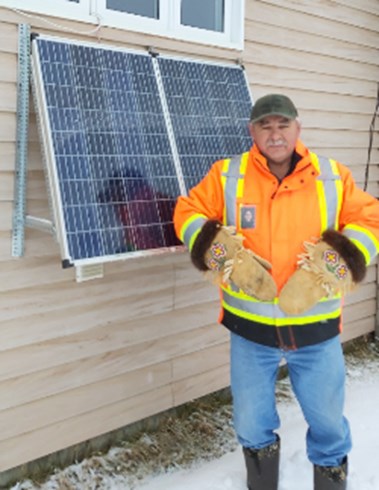Elders from up the coast, who’ve lived off the land, have been noticing big changes in weather patterns and animal behaviours, says Moose Factory's resident Fred Richard.
Richard was among a handful of participants during a community energy session held by the Moose Cree Energy Literacy Project Tuesday night.
The three-year project, spreading energy literacy among Moose Cree community members, was launched last year and is now halfway through.
Typically, people would gather for events and town hall meetings but with the pandemic, virtual discussions were held so far, said Glen Schrader, the project's technical consultant. Without being able to meet in person, it’s been challenging to get people involved and committed, he added.
The summer of 2021 has had many weather extremes: from hot dry weather in western Canada and the U.S. to heavy rains in New Brunswick and Europe, he said.
"When this happens in the wintertime, we call it a polar vortex. But the same weather extreme, a strong upper level low, can also happen during the summer," Schrader explained.
For the Moose Cree community, that means changes.
Some of those changes noticed by Elders included sightings of unusual birds that have never been seen on the island before, polar bears visits, belugas coming in mid-summer looking for food, and some trees already changing the colour of the leaves, Richard said.
“It’s gotten to the point where (seasons) blend together in such a way that we question (it),” he said during Tuesday's event. “I, for once, firmly believe this is due to climate change.”
The first part of energy literacy is having an understanding of the nature and role of energy in the world and daily lives, Schrader said. The second part is the ability to apply this understanding to answer questions and solve problems.
“Learning about and then installing solar panels and using LED lights to conserve energy are excellent examples of energy literacy in action. But it is so much more because energy impacts our everyday lives, our society, and our culture,” he said.
The first stage of the project is funded by Natural Resources Canada through the Clean Energy for Rural and Remote Communities (CERRC) program under a Capacity Building stream.
The project runners also plan to partner with a local startup business to champion energy literacy initiatives with the community.
This spring, the organizers held three online and in-person info sessions with schools in Moose Factory and Moosonee.
Schrader said they talked about the energy project Moose Cree is involved in and its participation in the Lower Mattagami River project along with Hydro One. They also talked about solar power and energy conservation, and encouraged students to ask questions and be more curious about renewable energy and energy use.
The next step would be working on a specific idea or project that community members might have.
“Right now, people have lots of ideas and what we’re trying to do is give them information, so they can make informed decisions from there,” Schrader said. “Right now, we’re very much at the idea stage.”



